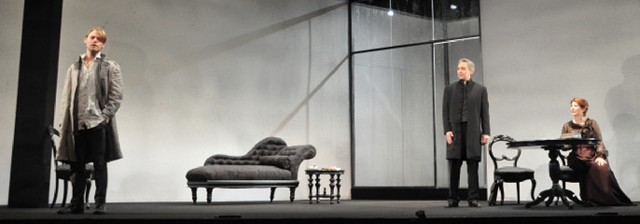Shining Night: A Portrait of Composer Morten Lauridsen (Song Without Borders). This is the documentary by Michael Stillwater that I wrote about with the utmost enthusiasm earlier this year in The Wall Street Journal. I can’t recommend it strongly enough now that it’s available on home video, both as an introduction to one of this country’s best composers and as a model of how to tell an artist’s story on film (TT).
Archives for June 2012
BOOK
James Garner and Jon Winokur, The Garner Files: A Memoir (Simon & Schuster, $25.99). Most ghostwritten celebrity autobiographies are a waste of time. Not so The Garner Files, which is unselfconscious, unpretentious, and ungossipy–but frank. If, like David Thomson and me, you esteem the star of Maverick, The Rockford Files, and Support Your Local Sheriff! as one of Hollywood’s outstanding on-camera craftsmen, you’ll gallop through it with delight. I only wish it were twice as long (TT).
TT: 1378 and all that
In today’s Wall Street Journal I review the off-Broadway premiere of Kenneth Lonergan’s Medieval Play and a San Diego-area revival, North Coast Rep’s double bill of Harold Pinter’s The Lover and The Dumb Waiter. Here’s an excerpt.
* * *
Kenneth Lonergan is a master of subtle, intimate theatrical naturalism who decisively established himself in “This Is Our Youth,” “You Can Count on Me” and “The Starry Messenger” as one of America’s foremost playwrights and screenwriters. But he is also, lest we forget, a co-author of the screenplay for “Analyze This,” and his broadly comic side comes to the fore in “Medieval Play,” a mile-wide farce about the Great Schism of 1378 which has about as much in common with “The Starry Messenger” as “Airplane!” has with “The Seventh Seal.” “Medieval Play” is billed as “a new and meandering comedy with no contemporary parallels worth noting.” I suspect that this blurb was penned by Mr. Lonergan himself, because it nicely conveys the feel of “Medieval Play,” which is by turns silly and sophomoric, surprisingly smart, very funny and–sure enough–meandering.
 If you aren’t familiar with the Great Schism, it’s enough to say that the Roman Catholic Church had two popes between 1378 and 1417, one based in Italy and the other in France, and that the rival claimants to the papal throne, not to mention their respective supporters, didn’t get along even slightly. Enter Sir Ralph (Josh Hamilton) and Sir Alfred (Tate Donovan), a pair of moronic knights who stumble into the middle of this messy conflict and, inspired by Catherine of Siena (Heather Burns), forswear raping and pillaging oand endeavor with limited success to hew to the path of righteousness.
If you aren’t familiar with the Great Schism, it’s enough to say that the Roman Catholic Church had two popes between 1378 and 1417, one based in Italy and the other in France, and that the rival claimants to the papal throne, not to mention their respective supporters, didn’t get along even slightly. Enter Sir Ralph (Josh Hamilton) and Sir Alfred (Tate Donovan), a pair of moronic knights who stumble into the middle of this messy conflict and, inspired by Catherine of Siena (Heather Burns), forswear raping and pillaging oand endeavor with limited success to hew to the path of righteousness.
Mr. Lonergan has turned this conflict into a one-joke play, the joke being that all of the characters in “Medieval Play” speak not in the language of Europe circa 1378 but of America circa 2012….
The problem is that in addition to writing the script, he’s also staged it. It’s not that he isn’t a good director, but anyone else would have ordered him to cut at least a half hour, if not more, out of “Medieval Play.” Instead we get a one-joke show that runs for 155 minutes. If, like me, you have a furtive fondness for brainy juvenile humor, you’ll enjoy yourself anyway, but the fact remains that “Medieval Play” is far too long for its own good….
The enigmatic plays of Harold Pinter are still a hard sell at most regional theaters, so I thought it would be interesting to see how they went over when mounted by a San Diego-area company headquartered in a shopping center. Judging by the unselfconsciously enthusiastic response of the crowd that turned out for the opening night of North Coast Repertory Theatre’s double bill of “The Lover” and “The Dumb Waiter,” it appears that Mr. Pinter has a big future in the suburbs….
David Ellenstein, the company’s artistic director, has put together a dynamite cast led by Elaine Rivkin, a Chicago-based actor who is icebox-cool in “The Lover” as a dissatisfied housewife who dallies each afternoon with…but I mustn’t give it away. Mr. Ellenstein’s cracker-crisp staging points up the laughter in both plays without stinting on their underlying menace…
* * *
Read the whole thing here.
The set change for North Coast Rep’s double bill of The Lover and The Dumb Waiter, accompanied by Schumann’s A Minor Piano Concerto:
TT: The seductive lure of abstraction
My recent visit to the Orange County Museum of Art’s Richard Diebenkorn retrospective has yielded up a “Sightings” column for today’s Wall Street Journal. Here’s an excerpt.
* * *
 One of the most satisfying museum retrospectives ever devoted to an American artist is now traveling from coast to coast. “Richard Diebenkorn: The Ocean Park Series,” which closed at California’s Orange County Museum of Art two weeks ago and will reopen on June 30 at the Corcoran Gallery of Art in Washington, D.C., consists of 75-odd abstract paintings and works on paper made by Diebenkorn between 1967 and 1987, the years when he worked out of a studio in the Ocean Park neighborhood of Santa Monica….
One of the most satisfying museum retrospectives ever devoted to an American artist is now traveling from coast to coast. “Richard Diebenkorn: The Ocean Park Series,” which closed at California’s Orange County Museum of Art two weeks ago and will reopen on June 30 at the Corcoran Gallery of Art in Washington, D.C., consists of 75-odd abstract paintings and works on paper made by Diebenkorn between 1967 and 1987, the years when he worked out of a studio in the Ocean Park neighborhood of Santa Monica….
Part of what makes the Ocean Park series so fascinating is that Diebenkorn, who died in 1993, waged a lifelong “battle” with abstraction. He started out as a gifted abstract-expressionist painter. In 1955 he suddenly embraced representation, turning out dozens of figurative paintings that translate the language of Matisse into a wholly personal, semi-abstract style. Then, in the Ocean Park series, he made a decisive return to abstraction, in the process creating the most original works of his career.
To chart Diebenkorn’s stylistic development is to be reminded of the near-overwhelming power of the idea of abstraction in the 20th century. It was even felt by artists who, like Pierre Bonnard and Fairfield Porter, never produced an abstract painting in their lives, but were nonetheless influenced by the way in which practitioners of abstraction created what Diebenkorn called “invented landscapes,” non-objective images that evoked the world of tangible reality while steering clear of literal representation.
 The idea of abstraction is so central to the history of modern art that it left its mark on the work of non-visual artists as well. George Balanchine, for example, is best remembered for the many “plotless” ballets that he made to the music of Igor Stravinsky. The Russian-born choreographer never used the word “abstract” to describe them. “Dancer is not a color,” he said. “Dancer is a person.” But to look at a dance like “Stravinsky Violin Concerto,” in which still-recognizable human relationships are stripped of all literal meaning, is to suspect that Balanchine saw in his youth at least some of the innovative canvases in which Vasily Kandinsky, his fellow countryman, dispensed with the pictorial restrictions of figurative art to become the first abstract painter….
The idea of abstraction is so central to the history of modern art that it left its mark on the work of non-visual artists as well. George Balanchine, for example, is best remembered for the many “plotless” ballets that he made to the music of Igor Stravinsky. The Russian-born choreographer never used the word “abstract” to describe them. “Dancer is not a color,” he said. “Dancer is a person.” But to look at a dance like “Stravinsky Violin Concerto,” in which still-recognizable human relationships are stripped of all literal meaning, is to suspect that Balanchine saw in his youth at least some of the innovative canvases in which Vasily Kandinsky, his fellow countryman, dispensed with the pictorial restrictions of figurative art to become the first abstract painter….
* * *
Read the whole thing here.
An excerpt from Balanchine, a 1984 PBS documentary narrated by Frank Langella, in which George Balanchine and Igor Stravinsky are seen in conversation. The clip includes excerpts from three Balanchine-Stravinsky ballets, Agon, Balustrade, and Stravinsky Violin Concerto:
TT: Almanac
“It is after creation, in the elation of success, or the gloom of failure, that love becomes essential.”
Cyril Connolly, Enemies of Promise
TT: Four aces
Gordon Edelstein, the director of Satchmo at the Waldorf, has now nailed down the four key members of the show’s design team. It is, if I do say so myself, a pretty damned impressive lineup:
 • Lee Savage, the set designer, is a founding member of Wingspace Theatrical Design. He’s designed shows for Asolo Rep, the Old Globe, the Roundabout Theatre Company, Washington’s Shakespeare Theatre Company, Two River Theater Company, Westport Country Playhouse, Wilma Theater, and the Yale Repertory Theater. His arrestingly stark set for the Berkshire Theatre Festival’s revival of Henrik Ibsen’s Ghosts (pictured above) caught my eye when I reviewed that production for The Wall Street Journal in 2009.
• Lee Savage, the set designer, is a founding member of Wingspace Theatrical Design. He’s designed shows for Asolo Rep, the Old Globe, the Roundabout Theatre Company, Washington’s Shakespeare Theatre Company, Two River Theater Company, Westport Country Playhouse, Wilma Theater, and the Yale Repertory Theater. His arrestingly stark set for the Berkshire Theatre Festival’s revival of Henrik Ibsen’s Ghosts (pictured above) caught my eye when I reviewed that production for The Wall Street Journal in 2009.
• Ilona Somogyi, the costume designer, is currently represented on Broadway by Clybourne Park. A lecturer in design at the Yale School of Drama, she designed the costumes for Hartford Stage’s productions of The Crucible and A Midsummer Night’s Dream, both of which I reviewed enthusiastically in the Journal.
• Stephen Strawbridge, the resident lighting designer of the Yale Repertory Theatre and co-chair of the Yale School of Drama’s design department, has worked on more noteworthy shows than I can list, including Signature Theatre Company’s recent revival of Athol Fugard’s Blood Knot and the off-Broadway premieres of Bernarda Alba, Black Tie, The Glorious Ones, and A Perfect Ganesh. He has also designed nineteen works for Pilobolus Dance Theatre.
 • John Gromada, the all-important sound designer and composer of incidental music for Satchmo at the Waldorf, did the honors for six shows that opened on Broadway this past season: The Best Man, Clybourne Park, The Columnist, Man and Boy, The Road to Mecca, and Seminar. He also scored Michael Wilson’s landmark production of Horton Foote’s Orphans’ Home Cycle, which opened at Hartford Stage, then transferred to New York’s Signature Theatre Company.
• John Gromada, the all-important sound designer and composer of incidental music for Satchmo at the Waldorf, did the honors for six shows that opened on Broadway this past season: The Best Man, Clybourne Park, The Columnist, Man and Boy, The Road to Mecca, and Seminar. He also scored Michael Wilson’s landmark production of Horton Foote’s Orphans’ Home Cycle, which opened at Hartford Stage, then transferred to New York’s Signature Theatre Company.
I am immensely proud to be working with them all.
* * *
Ilona Somogyi talks about her costumes for Hartford Stage’s 2008 production of A Midsummer Night’s Dream:
Part of a recording session for John Gromada’s Orphans’ Home Cycle score:
TT: So you want to see a show?
Here’s my list of recommended Broadway, off-Broadway, and out-of-town shows, updated weekly. In all cases, I gave these shows favorable reviews (if sometimes qualifiedly so) in The Wall Street Journal when they opened. For more information, click on the title.
BROADWAY:
• Anything Goes (musical, G/PG-13, mildly adult subject matter that will be unintelligible to children, closes Sept. 9, reviewed here)
• The Best Man (drama, PG-13, closes Sept. 9, most performances sold out last week, reviewed here)
• Evita (musical, PG-13, all performances sold out last week, reviewed here)
• Godspell (musical, G, suitable for children, reviewed here)
• Once (musical, G/PG-13, all performances sold out last week, reviewed here)
OFF BROADWAY:
• Avenue Q (musical, R, adult subject matter and one show-stopping scene of puppet-on-puppet sex, reviewed here)
• The Fantasticks (musical, G, suitable for children capable of enjoying a love story, reviewed here)
• 4000 Miles (drama, PG-13, closes July 1, reviewed here)
• Tribes (drama, PG-13, closes Sept. 2, reviewed here)
CLOSING SOON ON BROADWAY:
• The Columnist (drama, PG-13/R, closes July 1, most performances sold out last week, reviewed here)
CLOSING SOON OFF BROADWAY:
• Man and Superman (serious comedy, G, far too long and complex for children of any age, closes July 1, reviewed here)
• Million Dollar Quartet (jukebox musical, G, off-Broadway remounting of Broadway production, closes June 24, original run reviewed here)
CLOSING NEXT WEEK ON BROADWAY:
• Other Desert Cities (drama, PG-13, adult subject matter, closes June 17, reviewed here)
• Venus in Fur (serious comedy, R, adult subject matter, closes June 17, reviewed here)
CLOSING NEXT WEEK IN CHICAGO:
• The Iceman Cometh (drama, PG-13, closes June 17, reviewed here)
CLOSING NEXT WEEK IN LA JOLLA:
• Hands on a Hardbody (musical, PG-13, closes June 17, reviewed here)
CLOSING NEXT WEEK IN SAN DIEGO:
• Nobody Loves You (musical, PG-13, closes June 17, reviewed here)
CLOSING SATURDAY IN LOS ANGELES:
• Follies (musical, PG-13, adult subject matter, transfer of Kennedy Center/Broadway revival, original run reviewed here)
CLOSING SUNDAY IN CHICAGO:
• Timon of Athens (Shakespeare, PG-13, reviewed here)
CLOSING SUNDAY IN COSTA MESA, CALIF.:
• Jitney (drama, PG-13, reviewed here)
TT: The long goodbye (complete)
For those who asked, you can now read all three parts of “The Long Goodbye” in a single file by clicking on the link.
[Read more…]
